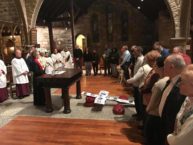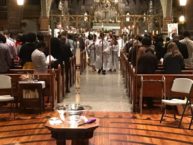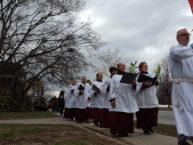 June 13, 2021: May God’s words be spoken, may God’s words be heard. Amen.
June 13, 2021: May God’s words be spoken, may God’s words be heard. Amen.
If you have never had a chance to watch a Monty Python movie, well… what are you waiting for? Anyway, as I was thinking about the readings for today, I was reminded of one nearly iconic scene from the classic “Monty Python and the Holy Grail.” The movie is about King Arthur and his knight’s pursuit of the Holy Grail, the chalice Jesus used at the last supper. In this scene, the King and his knights have been at this quest for awhile, when they happened upon an enchanter named Tim – yup, Tim the Enchanter. Anyway, Tim tells them that he will lead them to a cave where they will find what they are looking for, but beware – that cave is guarded by the most treacherous of creatures. “…follow only if ye be men of valor,” says Tim, “for the entrance to this cave is guarded by a creature so foul, so cruel that no man yet has fought with it and lived! Bones of forty…fifty men, lie strewn about its lair. So, brave knights, if you do doubt your courage or your strength, come no further, for death awaits you all with nasty big pointy teeth.”
They all think Tim is a bit over enchanted about this supposed beast, so, off they go until they come to the cave. King Arthur starts to approach when the beast appears:
TIM: There he is!
ARTHUR: Where?
TIM: There!
ARTHUR: What, behind the rabbit?
TIM: It is the rabbit!
ARTHUR: You silly sod! You got us all worked up!
TIM: Well, that’s no ordinary rabbit. That’s the most foul, cruel, and bad-tempered rodent you ever set eyes on.
SIR ROBIN: You [fool]!, said Sir Robin, I soiled my armor I was so scared!
TIM: Look, that rabbit’s got a vicious streak a mile wide, it’s a killer!
Well, they don’t listen, they send a knight up to the rabbit, and he is slaughtered. They are out of options, so they employ the Holy Hand Grenade of Antioch, and the rest is cinematic history. (To see this clip, click this link: Monty Python & The Holy Grail Bunny Scene)
What has a killer rabbit scene got to do with our scripture lessons? Good question…let’s find out.
In the first reading this morning from the first book of Samuel, Samuel is sent to find the next king of Israel, and he is told it will be one of the sons of Jesse. As each son is brought before him (sort of like some kind of kingly beauty pageant), Samuel looks at these handsome guys and thinks “this must be the one – he would look so kingly on that throne!” Why – because, dang they looked good and they were tall. But God says to him, “Do not look on his appearance or on the height of his stature, because I have rejected him; for God does not see as mortals see; they look on the outward appearance, but God looks on the heart.” In other words, God was looking for a nice guy, good sense of humor, who likes long walks in the rain – so swipe left Samuel. Eventually God says swipe right when the last son is brought forward out of the fields where he had been tending to the flock. God ends up choosing the youngest, a small ruddy but not too bad on the eyes – David.
Now for the gospel we heard… Jesus compares the Kingdom of God to a sower who spreads seeds which grow into a harvest of grain, but he doesn’t know how it happens, and to the tiny mustard seed, which grows into “the greatest of all shrubs,” which then provides shelter for many birds.
So, what do we have here… a little shepherd, a little seed, a harvest of grain, a huge shrub, an anointed King, a sower of seeds, oh… and a little killer rabbit. (we’ll skip the Holy Hand Grenade of Antioch).
Believe it or not, there is a connection here, and it is one we all need to pay attention to today. On the surface, there is the obvious – that we shouldn’t judge a rabbit by its fur, or more seriously, that we need to remember that we humans have biases that will, if we let them, prevent us from seeing God at work in the world…and of course, stay away from killer rabbits.
The thing is, we sometimes think we wouldn’t pre-judge anyone in the way that Samuel did with Jesse’s boys, or King Arthur with the rabbit, but sadly, we do it all the time. Think about it. What is the mental image that immediately comes to mind when I say: CEO, nurse, doctor, janitor, computer expert, teacher. When I said CEO, did you imagine a woman? How about a man as a nurse? Was the doctor black? Was the janitor white? Was the computer expert female? Was the teacher Muslim, Jewish, Indian, or Gay?
For that matter, what about our church leaders? How many times have we heard people in churches say that they want their next Rector to be a young priest with a family. What is often meant by that is a white male with a wife, two kids, and a dog.
If you really want to know about how this works in your own life, try the Harvard Implicit Association tests sometimes – we actually use it in our diocese as pre-work for our required Anti-Sexism Training. They are available online (I will put a link in the sermon when it is posted). “Developed by Harvard social scientists, it’s a collection of surveys that measure one’s likelihood of associating positive and negative descriptors to pictures of different types of people. If you take it, be prepared to follow your test results with prayer and confession.”[1]
The first lesson from our scriptures today then is that God is at work often in the ones we least expect, or even the ones we appreciate the least. The kid that would be King David and the small mustard seed that would grow into an enormous shrub. Neither, by the way, are perfect. David does some pretty terrible things, but by God’s grace he was redeemed to be the King he was called to be. The mustard shrub is not some beautiful plant, but more like an invasive weed. To people in Jesus’ day, this sounded like some sort of joke. Like today saying the NJ Russian Olive tree is the greatest of shrubs and like the Kingdom of God, rather than an annoying invasive species that has taken over everywhere. But you see, that is exactly the point – not only does God choose the ones we least expect, but God doesn’t expect perfection of us. Which is a good thing, since that would be impossible.
Yet if we stop there, we really miss something powerful and life changing. No, not the Holy Hand Grenade of Antioch, but that sower tossing seed that grows without really understanding how.
I am reminded of something said to the late Rt. Rev. Barbara Harris, the first woman to be ordained and consecrated a bishop in the worldwide Anglican Communion. She had been a priest a little over eight years when she was consecrated bishop, and there were many people then who did not support the ordination of women to the priesthood, let alone as bishop. Adding to it all was that she was also the first woman of color to be ordained as a bishop. Internal struggles with call are part of the story of most clergy, really most biblical prophets too; but, Bishop Harris certainly had enough external pressures telling her she was not worthy of this. She wasn’t what many people expected.
When talking about her call many years later, she quoted a friend who said to her something she never forgot. “God doesn’t call those who are worthy. God makes worthy those whom God would call.”
“God doesn’t call those who are worthy. God makes worthy those whom God would call.”
Or put another way, you don’t have to figure it all out, or be perfect, or do super-human things like some action hero…just take the seeds God gives to you, the gifts you have, and toss them about. God will do the rest. We don’t have to be measures of absolute perfection, because like the sower in the parable – we don’t do this work alone…God does it through us, and it is never fully finished, so perfection can never be achieved anyway.
The only thing we have to do is remove our own implicit bias about who we are – because that same thing we do about others – we do it the most to ourselves.
We so often think that we have to be rich, or good looking, or have great luck, or any numbers of things, for us to make a difference in the world. After all, we say, what can I do. I am only one person – one very busy person. Our Hollywood super heroes don’t help either. Have you noticed – they are rarely short, balding, female, overweight, gay, black, Asian, Muslim, Jewish, or in any other way out of the stereotypical normative box. Heck, we even try to make Jesus look all buff any time he is depicted in the movies – like he was a member of the Galilean YMCA. I wonder how folks would feel if a movie came out with Jesus being bald, chubby, or even – gasp – what he actually was a …Middle-Eastern Jew! Nope – we like our super-heroes to be – well, super-sized, not to mention placed in narrow racial, gender, and cultural stereotypes. And we certainly don’t usually see ourselves as being capable of doing the things these heroes do.
Yet all we are asked to do is to be open to being chosen, because here’s the thing…we are chosen! We are anointed by God in our baptism. And our call is to grow into our role like that mustard seed – to joyously share the good news of Christ like that sower – to see God at work in the ones other cast aside. The power of these scriptures today is to remind us of something we have lost over time. That each one of us has the power to change the world, to bring about the kingdom of God – here, now.
We don’t have to be perfect.
We don’t have to know how it will all happen.
We don’t need to fit the mold others think of as change makers – leaders in faith.
We just have to be willing to step boldly forward in faith, and let God do the rest.
I want to share with you a story of a woman of great faith who did exactly that. I have mentioned her before, and following her recent death, the documentary short I produced about her back in 2007 was posted on our website. Her name was Sister Jane Maanka. (To see the documentary, click here: Sister Jane’s Children)
Sister Jane grew up in Cameroon on the West Africa coast in a home with no electricity, doors or running water. But as an adult many years ago, she encountered an orphan on the street, one of the more than 18 million in sub-Saharan Africa who had lost their parents to AIDs by that time. She felt such a strong call by God to do something to help, she wanted to start a home for these children and a convent of Sisters who would care for them, in the name of Christ. Here she was – a woman with little means in a country without a lot of public services. Some might have seen her as insignificant as a small mustard seed, but thankfully, she didn’t let that stop her.
She talked to a Roman Catholic priest who, instead of telling her why she couldn’t, told her what she needed to do – she had to come to America to raise money. Now I think many of us at that point might have thrown in the towel. We might have seen the journey as too difficult, and ourselves too ill equipped. And we might have said to God – what were you thinking?
Others might not have responded as the Catholic priest did. We might have tried to save Sister Jane from “failure” – we might not have mentored her to live into this call. We would have told her it was too big a task. But neither he nor Sister Jane gave in to the fear. Funded by that priest, she did come to the US, and with the help of many, especially the sisters of the Community of St. John Baptist, our Episcopal Convent here in Mendham New Jersey, she returned to Cameroon with many seeds to spread around, and by God’s grace, she created a convent, an orphanage, and more.
By the time I arrived in Bamenda Cameroon in 2007, at what ended up being named the Good Shepherd Home, there were 42 children being cared for by six nuns and a few staff. At the of her death just a short time ago, that had expanded to a self-sustaining community of over 150 children – none of whom are ever put up for adoption – a school, a medical facility, and more.
None of it would have happened if Sister Jane had not stopped in her busy life of caring for all her brothers and sisters – stopped and noticed the orphan in front of her, and heard the call of God to respond. None of it would have happened if she had given into fear that she couldn’t do it, or that she had to do it all on her own, or if that first priest looked on her as too insignificant to be called to such a large ministry as this, or if the sisters in the US and others had thought it impossible to achieve.
Sadly, both the Rt. Rev. Barbara C. Harris, and Sister Jane Maanka have recently left this mortal plane, but their stories live on because of the seeds they sowed with wild abandon in their lives in Christ.
So what about you?
God is at work today doing amazing things through those God chooses, and make no mistake about it: God has chosen each and every one of you.
We won’t understand how it all works, this anointed life we are called to, but the seeds we joyously share are the gifts of grace God will give us, and what will grow from them will be wonderous beyond imagination.
And one thing is for sure, with Christ by our side, we won’t need to worry about killer rabbits, or having the Holy Hand Grenade of Antioch handy.
All we will need is to remember that we are chosen by God, who makes worthy those whom God would call.
Amen.
For the audio, click below, or subscribe to our iTunes Sermon Podcast by clicking here:
[1] Homiletics Online, adapted.
The Rev. Diana L. Wilcox
Christ Church in Bloomfield & Glen Ridge
June 13, 2021
The Third Sunday After Pentecost
1st Reading – 1 Samuel 15:34-16:13
Psalm 20
2nd Reading – 2 Corinthians 5:6-10,[11-13],14-17
Gospel – Mark 4:26-34






